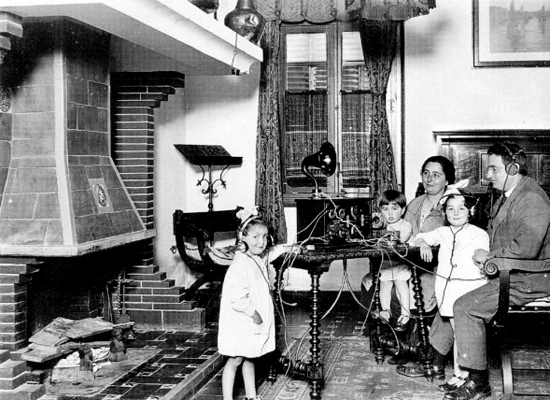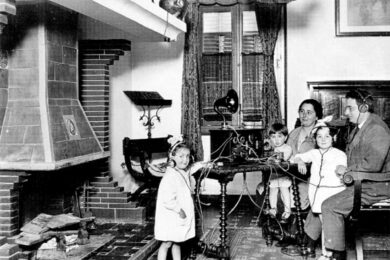That British culture will be immeasurably worse off without BBC 6 Music and the Asian Network is undeniable. Looking at this graphic, showing the relative spending by the BBC on channels, outputs and services, merely lends itself to the suspicion that the decision has more to do with making sacrifices to appease the Murdoch press and potential new Tory government than genuine cost cutting.
Whatever the reasons for 6 Music’s closure (and the argument that culling it is part of a drive for quality is a bracingly nonsensical one), there are manifold consequences to this decision. Perhaps most importantly, it will have a disastrous impact on the already struggling independent sector. Umpteen independent label bosses and staff I’ve spoken to this morning have said that 6 Music was the one radio station where their artists would be played. Though it’s undeniably a ludicrous situation that says a lot about the state of mainstream music journalism, press would follow the 6 Music lead, covering artists that presenters had featured on their shows. The same, I am told, goes for retail, who would give shelf space to fringe artists who had been featured on 6 Music. I can speak from personal experience too. When I looked after the interests of now sadly departed group One More Grain, 6 Music was the station that gave the group a decent airing, even if half the time plays had been generated by texting in from a selection of mobile phone numbers pretending to be Bill from Bermondsey.
Yet I have to confess I never paid much attention to 6 Music’s daytime content, which often feels like taking your office desk to an indie disco. For me, the treasures of 6 Music lie in the evening – Stuart Maconie’s Freak Zone is one of the best programmes on any radio station, veering between the Caretaker, Kosmische, folk, global sounds and psychedelia, fascinating, in depth interviews the music of labels like Ghostbox in the time it takes to eat a Sunday night roast. The same goes for Dave Pearce’s excellent bangers show that followed it, or the specialist programming from Craig Charles, Bruce Dickinson, and so on. The BBC claims that some of these shows might end up finding their way onto Radio 1 or 2, but it’s hard to imagine the presenters being allowed the same freedom as they are now. What’s more, Thompson’s assertion that there should be no "age creep" towards a younger audience for Radio 2 smacks of that common misconception that once you’re done with contemporary pop, it’s straight over to the pipe and slipper rockist canon. At the Quietus, we have always felt that 6 Music was doing something similar to our desire to create a publication for those too old for chirpy young indie bands, and never old enough to settle down to a lifetime of pre-70s classicism.
No doubt the supporters of Thompson’s decision would argue in an age of cultural fragmentation, both in terms of music by genre and how we consume it, the fringe, evening shows that were the creative jewels in the station’s crown and are now being lamented, merely cover music that is increasingly well served on the internet. I would disagree – not everyone has the time or inclination to actively trawl the net in search of new music.
Back when I was listening to Radio 1 in my teens, the abysmal daytime fare was countered by Mark & Lard’s brilliant mixture of music, poetry and banter, followed by John Peel and Andy Kershaw. These, like the evening presenters on 6 Music, were experts guiding us to pastures new and, if you wanted to explore these new sounds, Radio 1 was about the only place you could do it. Now, the choices are limitless. But without your Maconies and Dangerous Daves and their knowledgeable studio guests, who are the gatekeepers, the quality controllers?
It’d be nice to think that Facebook groups, hashtag Twittering, and emails into the BBC trust might alter this sad decision. This evening, BBC Trust chairman Sir Michael Lyons seemed to offer a glimmer of hope. We can but wait and see. It’s not only a shame, but lunacy, that the station doesn’t seem to have been given enough time to settle down since the departure of the reviled prattler George Lamb his replacement in the morning with the surprisingly good Lauren Laverne, and the introduction of new presenters such as Jarvis Cocker.
But finally, and this to me seems the crux of the argument, it seems entirely bizarre to close down a flagship digital station before analogue radio is turned off. The (relatively) low listener figures surely have a lot to do with the fact that many households don’t yet own a DAB set, let alone their being installed in cars? If only nine million receivers have been sold, that surely makes the statistic that 20% of adults (7.4 million) have heard of the station actually quite reasonable, a great foundation on which to build? That when the digital switchover takes place 6 Music might no longer exist is a crying shame. If the station is saved, and more risks are taken in the daytime, then we all owe it to that decision to ensure that, in the future, we actually tune in.



